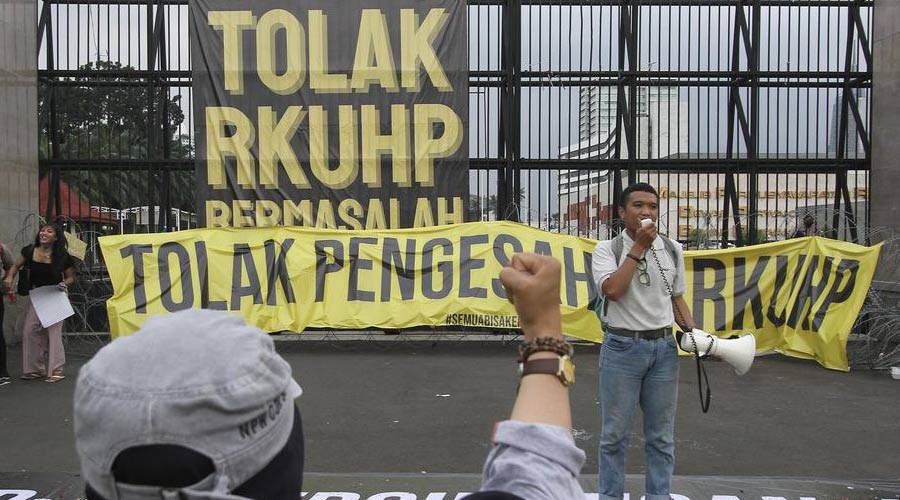Lawmakers in Indonesia approved changes to the country's criminal code on Tuesday, introducing a sweeping and controversial legal overhaul.
Critics urged Indonesia's House of Representatives not to ratify the package — which includes measures that can punish sex outside of marriage with prison time, and outline prison sentences for couples who live together outside of wedlock.
Members of the House of Representatives approved the bill with support from all the major parties, amid flak from critics who say that it will threaten civic freedoms in the world's largest Muslim country
Although the criminal code has been ratified, it will not go into effect for three years.
At present, Indonesia bans adultery but not premarital sex.
Much of criminal code can be traced back to colonial rule by Netherlands
"This has been 59 years in waiting," Edward Omar Sharif, Deputy Minister for Law and Human Rights, said.
Under the bill, sex outside of marriage is punishable by one year in prison and couples who live together out of wedlock could face six months in jail.
However, for police to be able to open a criminal probe into such acts, a family member should file a complaint.
From the time Indonesia declared independence from the Dutch, the revision of the criminal code has been a matter of discussion in the Southeast Asian nation.
"The old code belongs to Dutch heritage... and is no longer relevant now," Bambang Wuryanto, head of the parliamentary commission in charge of revising the code, told lawmakers.
The contentious new laws will apply to Indonesians and foreigners alike.
Possible prison time for insulting state, fomenting unrest, spreading fake news
They also include a ban on insulting the president or state institutions and expressing views deemed to be counter to state ideology.
The bill also calls for a maximum jail time of three years for anyone who "attacks the dignity" of the president or vice president.
Any person insulting the government could be punished with up to 18 months in prison. If the offense leads to social unrest the jail term could stretch to three years.
Spreading "fake news" could hold a punishment of up to to six years in prison.
On Monday, hundreds of Indonesians protested in several cities, demanding that the bill be scrapped.
Meanwhile, rights groups have denounced the legislation as morality policing and activists see it as a clampdown on civil and political freedoms.
Rights groups concerned
Indonesia’s population is predominantly Muslim but the nation's recognized religions also include Protestantism, Catholicism, Hinduism, Buddhism and Confucianism.
While most Muslims practice a moderate version of Islam, there has been a rise in religious conservatism in recent years, which has also made its way into politics.
Blasphemy, the purported notion of insulting a religion or its central tenets, is already outlawed in Indonesia. The law can apply to all six of the country's recognized religions, and Human Rights Watch says Indonesia has used the law more aggressively in recent years. It can carry a five-year prison sentence.
Rights groups have said that the proposals in the bill highlight a growing shift towards fundamentalism in Indonesia, which has secularism enshrined in its constitution.
There are also concerns that these rules could have a major impact on the LGBTQ community in the country, where same-sex marriage is illegal.
Homosexuality is not illegal in Indonesia, barring the semi-autonomous Aceh province, but is generally considered taboo.
Stringent religion-based laws on relationships and sex are already there in some parts of Indonesia.
In sharia-ruled Aceh, public floggings have taken place for homosexuality and adultery.










